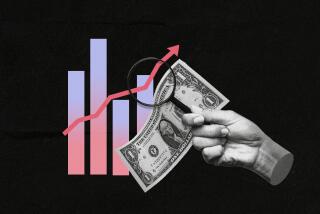Income Study Says, Like Father, Like Son
- Share via
There’s a simple way to get a leg up toward a good lifetime income--be the son of a high-income father.
A Princeton University economist who studied 876 pairs of fathers and sons found that sons of fathers in low-income brackets tend to end up in the same bracket, and vice versa.
“What I find is that there is much less mobility in the United States economy than had previously been believed,” David Zimmerman said in a recent interview.
Earlier studies reached the same conclusion. But Zimmerman said his is the first to track income data over a period of years instead of taking a snapshot.
Zimmerman, a lecturer and doctoral candidate at Princeton, used the National Longitudinal Survey, a database assembled at Ohio State University that tracked two groups of older and younger men for 15 years. He found 876 father-son pairs.
Looking at information on income and job type, Zimmerman found that 40% of the sons whose fathers were in the bottom 25% in income in 1965 were in the same bracket themselves in 1980 and 69% were in the lower half. Only 12% had risen to the top 25%.
At the same time, 41% of the sons with fathers in the top 25% in income were in that bracket 15 years later and 9% were in the lowest income group.
Almost half--49%--of the sons of professional men were professionals, while 11% held blue-collar jobs. On the flip side, 45% of the sons of blue-collar workers had the same type of job and 16% were in the professions.
“Mobility seems to be about the same whether you’re born into the highest or lowest income distribution,” he said.
Zimmerman concluded that the correlation between fathers’ and sons’ income levels is 0.4. In lay terms, that gives a son a 4% income advantage for every 10% that his father’s income is above average.
Previous studies had found a 0.2 correlation.
In Great Britain, traditionally thought to be a class-bound country with less social mobility, the correlation is 0.45, only slightly more than the United States, Zimmerman said.
Zimmerman believes that what holds the poor down and keeps the rich up is access to education.
“The link in educational attainment across generations can explain about 60% of the link in earnings across generations,” he said.
Although his sample included only working people, Zimmerman suggested that his findings may indicate that welfare is not the trap some people have thought, breeding dependence across generations.
What we may be seeing when the children of parents on welfare go on welfare themselves is “the intergenerational transmission of poverty,” he said.
More to Read
Inside the business of entertainment
The Wide Shot brings you news, analysis and insights on everything from streaming wars to production — and what it all means for the future.
You may occasionally receive promotional content from the Los Angeles Times.








